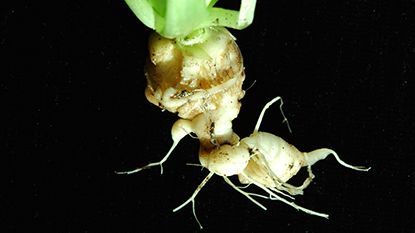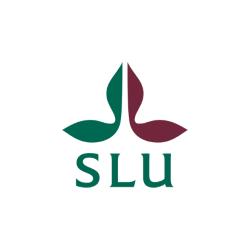
Pressmeddelande -
Clubroot parasite of Brassicaceae sequenced
Clubroot disease on a Chinese cabbage root. Photo: Arne Schwelm
The genome of the parasite that is causing clubroot disease on several agricultural and horticultural crops is now released. The new knowledge will hopefully be useful to develop better diagnostic methods, breeding strategies and elucidating the biology of this unique plant pathogen group.
Clubroot caused by Plasmodiophora brassicae, is a spreading soil-borne disease with high economical impact on Brassica oil- and vegetable crops and production of other valuable species within the family Brassicaceae worldwide.
Resting spores of P. brassicae are extremely resilient to harsh environmental conditions, and contaminate arable land for decades. This feature makes it impossible to eradicate the organism via any known chemical or alternative soil treatment.
Phylogenetically this protist is a Plasmodiophorid within the eukaryote supergroup Rhizaria and unrelated to other better known plant pathogens such as oomycetes and fungi. Spongospora subterranea, which causes powdery scab on potato, and the virus transmitting Polymyxa ssp. are other agricultural important pathogens in this group.
P. brassicae lives entirely underground and has a complex, partly unknown life-cycle. It requires a host to grow which together with its below-ground life has made the genome work extraordinary difficult.
The group of Professor Christina Dixelius at the Department of Plant Biology, SLU (together with collaborators from other SLU departments and Germany and South Korea) now present the small and compact genome of P. brassicae. With the developmental stage-specific transcriptomes and a transcriptome of S. subterranea, this are the first large scale genomic data of a pathogenic Rhizaria.
- The two pathogens are reduced in a number of metabolic pathways, and various phytohormones contribute to the gall phenotypes of infected roots, says Professor Dixelius.
Furthermore, chitin is important for formation of cell walls of the resilient resting spores and chitin-related enzymes are enriched in the Plasmodiophorids, and have experienced phylogenetic patterns not seen in eukaryotes before.
Future post-genomic work comprise re-sequencing of different pathotypes and elucidation of predicted effector proteins.
One issue of high priority is the much-awaited replacement of the rather imprecise and tedious pathotyping systems for P. brassicae into fast and more precise molecular diagnostic tools.
- Such knowledge would considerably support both professional counselling and resistance breeding. However, much work remains to give us a more complete understanding of this elusive organism.
Press photo
Clubroot disease on a Chinese cabbage root. Photo: Arne Schwelm 
Further reading
- The Plasmodiophora brassicae genome reveals insights in its life cycle and ancestry of chitin synthases

- BioSoM (Biological Soil Mapping), SLU

Contact information
- Professor Christina Dixelius, SLU, 018-67 32 34, Christina.Dixelius@slu.se
Ämnen
Kategorier
SLU:s vision: SLU är ett universitet i världsklass inom livs- och miljövetenskaper.


